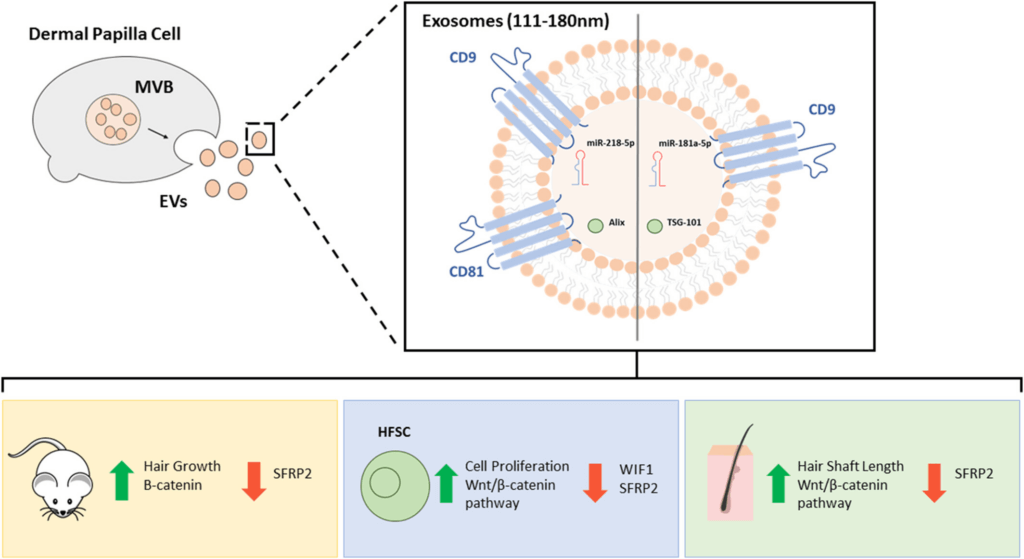Exosomes are small extracellular vesicles, typically ranging from 30 to 150 nanometres in diameter, secreted by various cell types into the extracellular environment. These vesicles play a crucial role in cell-to-cell communication by transporting proteins, lipids, RNA, and other molecules between cells.
Exosomes are formed within endosomal compartments called multivesicular bodies and are released into the extracellular space when these bodies fuse with the plasma membrane. The contents of exosomes reflect the cell of origin and can influence the function and behaviour of recipient cells, making them vital for various physiological and pathological processes, including immune responses, cancer progression, and tissue repair.
Recent research has highlighted the potential therapeutic applications of exosomes due to their ability to modulate cellular functions and deliver therapeutic agents. In regenerative medicine, for example, exosomes derived from stem cells have shown promise in promoting tissue repair and regeneration.
They have been explored as drug delivery vehicles due to their natural origin, biocompatibility, and ability to cross biological barriers. Furthermore, in the context of cancer, exosomes can carry tumour antigens to stimulate immune responses or deliver anti-cancer drugs directly to tumour cells. The growing understanding of exosome biology is paving the way for innovative treatments across various medical fields .
Multiple studies released in various medical journals in 2017, 2019 and 2023 have all confirmed that exosomes aid with hair loss treatments with minimum complications.
4 Ways Exosomes Work for Hair Loss
- Regeneration and Healing: Exosomes contain growth factors and signalling molecules that can promote the regeneration of damaged tissues. When applied to the scalp, these growth factors help stimulate the hair follicles, encouraging hair growth and improving the health of existing hair.
- Anti-Inflammatory Properties: Inflammation can contribute to hair loss, particularly in conditions like androgenetic alopecia. Exosomes possess anti-inflammatory properties, which can help reduce inflammation in the scalp, creating a healthier environment for hair follicles.
- Promotion of Hair Follicle Proliferation: Exosomes can stimulate the proliferation of dermal papilla cells (DPCs), which are crucial for hair follicle development and growth. By promoting the activity and health of these cells, exosomes can help increase the density and thickness of hair.
- Enhanced Cell Communication: Exosomes facilitate enhanced communication between cells. This improved cellular dialogue can lead to better coordination in the hair growth cycle, potentially extending the anagen (growth) phase of the hair.
Recent Research on Exosomes for Hair Loss

Several studies have shown the potential benefits of exosomes for hair restoration. For instance, a study published in Stem Cells Translational Medicine in 2017 found that exosomes derived from human adipose-derived stem cells (ADSCs) promoted hair growth in mice with androgenetic alopecia (AGA). These exosomes increased the proliferation of DPCs, essential for hair follicle regeneration.
Another study, published in the International Journal of Molecular Sciences in 2019, demonstrated that exosomes from human umbilical cord mesenchymal stem cells (hUC-MSCs) promoted hair growth in a rat model of AGA. The exosomes were found to increase the expression of genes involved in hair follicle development and growth.
Most recently, a systematic review published in the Journal of Cosmetic Dermatology in June 2023 evaluated both preclinical and clinical studies on exosome treatment for hair restoration. This review identified 16 studies showing varying degrees of efficacy using exosomes from sources like adipose-derived stem cells (ADSCs) and DPCs.
Notably, one clinical study involving 39 patients with androgenetic alopecia demonstrated significant increases in hair density and thickness following treatment with topical ADSC-derived exosomes. Importantly, no significant adverse reactions were reported, suggesting a favourable safety profile for exosome treatment.
Treatment Process

- Exosomes are typically extracted from mesenchymal stem cells (MSCs) sourced from bone marrow or adipose tissue. These exosomes are then purified and prepared for therapeutic use.
- The exosome solution is applied to the scalp, often through micro-needling or direct injection. Similarly to PRP. Micro-needling creates tiny punctures in the scalp, allowing the exosomes to penetrate deeper and more effectively reach the hair follicles.
- Patients may need to follow specific post-treatment care instructions to maximise the effectiveness of the therapy. This can include avoiding certain hair products or treatments and protecting the scalp from excessive sun exposure.
Benefits and Considerations
Exosome therapy is a non-surgical treatment, making it an attractive option for those seeking less invasive hair restoration methods. The procedure typically involves minimal downtime, with most patients able to resume their normal activities shortly after treatment.
Since exosomes utilise the body’s own regenerative capabilities, the results tend to look very natural. However, exosome therapy may not yet be widely available at all clinics. Some clinics such as the Artistry Clinic in London and Wellface in Surrey have introduced this treatment recently, and there might be a handful of others in the rest of the UK. Why? Because this treatment is brand new.
Promising Future
Exosomes represent a promising avenue for treating hair loss by harnessing the body’s natural healing and regenerative processes. While preliminary studies show encouraging results, more research will be needed to confirm the exact performance.
As the field evolves, exosome therapy may become a widely accepted treatment for hair loss, offering a non-surgical, natural-looking solution for those affected by this common condition. For those interested, it’s essential to consult with a healthcare professional to explore whether exosome therapy for hair loss is a viable option for you.


